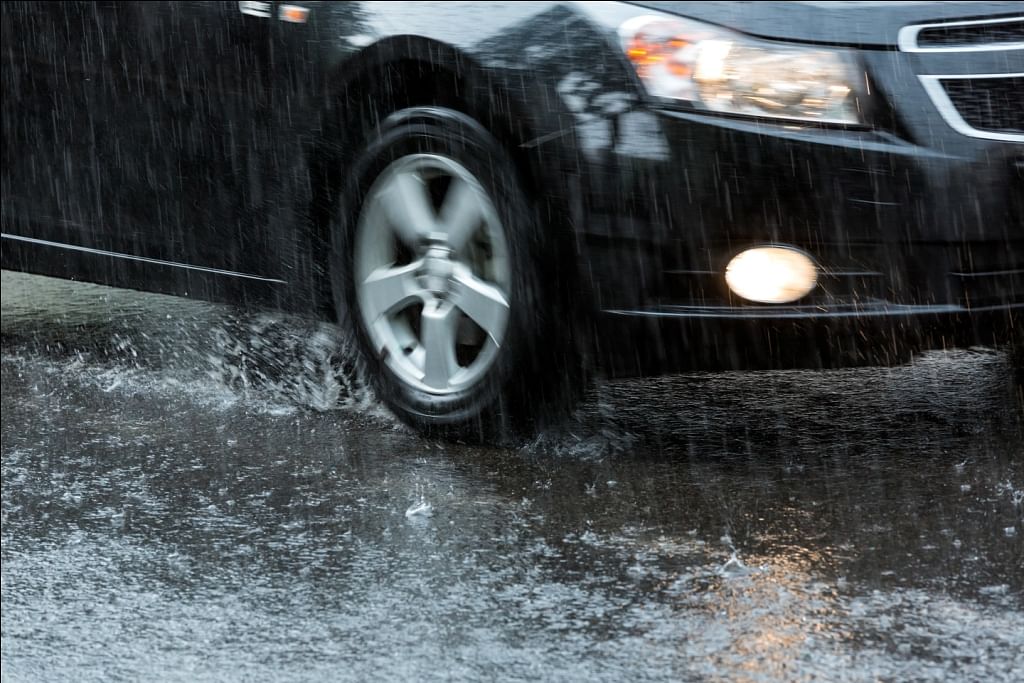Bosch to use Foreca’s predictive road-condition service for autonomous vehicle tech
Bosch estimates it would take some 20 million connected cars to cover the roughly 80,000 kilometres of freeway in Europe alone.
German Tier 1 supplier Bosch has announced that its alliance with Foreca, a leading provider of weather information, with two decades of experience in predicting road weather conditions will help the partners achieve a safety standard of the kind that will be necessary for life-critical systems such as automated driving.
At present automated vehicles do not react to haptic sensations as to the road condition, grip of the tyres, which a human driver responds too, there is a urgent need for automated vehicle to understand information about road conditions. Bosch has developed a system that gives automated vehicles seat-of-the-pants feel.
“Wet roads, snow, ice – with our predictive road-condition services, we alert to hazards before critical situations can develop. We are helped here by the weather data provided by our partner Foreca. This means an automated vehicle will know exactly where it can drive autonomously, and how,” said, the Bosch management board member Dr Dirk Hoheisel.
Foreca is one of the world’s leading providers of weather information, with two decades of experience in predicting road weather conditions. “Combining the expertise of Foreca and Bosch will lead to a new era of road-condition forecasting. Unlike weather forecasts in the media, the Bosch road-condition services take multiple possible forecast scenarios into consideration,” said Petri Marjava, Foreca’s sales director.
The road-condition services boost driving safety and smoothness. In addition, the availability of automated driving functions is increased. The Bosch services package is to be rolled out worldwide in 2020, initially on the basis of weather data. As more and more connected cars appear on the roads, the service will be augmented by vehicle data.
Autonomous vehicle

Bosch states that up to the highly automated SAE level 4, the decision as to whether a car can assume the task of driving depends on factors such as road type, speed range, and environmental conditions. In future automated vehicles, this decision will also be based on the predictive road-condition services provided by Bosch, wherein the automated vehicle will know in good time what environmental conditions to expect. For instance, if the vehicle’s route takes it through rain, it will adapt its speed well in advance to a level that excludes any risk of aquaplaning and allows it to stop safely at any time. Whatever the SAE automation level, the result is a safe drive that is also smooth and comfortable.
For its predictive road-condition services, Bosch is relying on a multiphase concept. By the time of its planned launch in 2020, the company states it cannot be expected that there will be a sufficiently large proportion of connected vehicles on the roads. Bosch estimates it would take some 20 million connected cars to cover the roughly 80,000 kilometres of freeway in Europe alone. For this reason, road-weather forecasts will initially be the only reliable source of information for drawing sound conclusions about road conditions, especially in rural areas where there is less traffic.
Bosch will get the constantly updated global road-weather data it needs for this from its partner Foreca. The Tier 1 major states that through thorough examination of several leading providers it concluded that the Finnish weather experts were the most accurate road-weather data provider globally. The more precisely hazardous conditions can be predicted and localised, the easier it will be to keep the availability of automated driving functions to a maximum. Thanks to a worldwide reference measuring fleet and machine learning methods, Bosch and Foreca have jointly been able to optimise the safety and availability of the road-weather models.
Supplementing predictive with real-time data
As a sufficient number of connected vehicles take to the roads, Bosch will supplement its predictive road-condition services with vehicle data. These data will include information stored on the CAN bus, the vehicle’s central data network, such as the temperatures measured inside and outside the vehicle, and whether the windshield wipers are in use. Thanks to connectivity, this data will not remain unused in the vehicle, but will find its way into the Bosch cloud via the respective automaker’s back-end server. In addition, Bosch will evaluate the regular interventions by the ESP anti-skid system. Using mathematical methods, engineers can measure the friction coefficient of the road surface at each individual wheel, as well as the status of each wheel. When all these data are combined and intelligently evaluated, the result is a package of Bosch’s smart services.
RELATED ARTICLES
Autoliv Plans JV for Advanced Safety Electronics With China’s HSAE
The new joint venture, which is to be located strategically near Shanghai and close to several existing Autoliv sites in...
JLR to Restart Production Over a Month After September Hacking
Manufacturing operations at the Tata Group-owned British luxury car and SUV manufacturer were shut down following a cybe...
BYD UK Sales Jump 880% in September to 11,271 units
Sales record sets the UK apart as the largest international market for BYD outside of China for the first time. The Seal...






 By Autocar Professional Bureau
By Autocar Professional Bureau
 26 Jul 2018
26 Jul 2018
 7111 Views
7111 Views








 Ajit Dalvi
Ajit Dalvi




